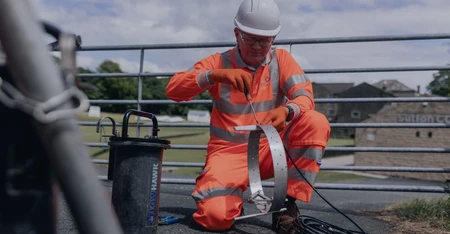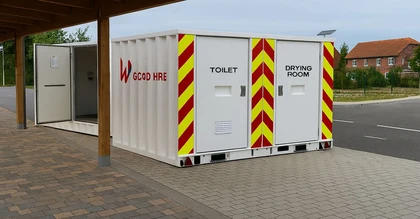Air quality monitoring for cleaner air and healthier environments. Tailored for professionals across industries, from construction and real estate to manufacturing and local authorities.
Our air quality monitoring and assessment services cater to a diverse range of professionals. From construction and real estate to industry and local authorities, we offer tailored solutions for cleaner air.
Our collaborative approach, ensuring close communication with clients and regulators, results in bespoke services that prevent delays and promote successful assessments. Whether it's screening, detailed assessments, or ecological impact evaluations, our teams cover it all.
Choosing us as your air monitoring and assessment service partner isn't just compliance; it's an investment in building a better tomorrow, together.

Talk to our experts

Strategic air quality monitoring, consultancy and assessments
Our approach
In the early stages of your project, we provide air quality monitoring advice to identify and mitigate potential impacts during the planning phase.
Our air quality expert’s guidance covers air quality assessment in alignment with recognised local, national, and international standards, addressing diverse needs in industrial, commercial, and private developments.
Whether supporting planning applications, conducting standalone reports, or contributing to broader environmental impact assessments, our services extend to environmental permit applications and compliance with ongoing regulatory monitoring. Through close collaboration with clients and regulators, we tailor our services to meet specific client requirements, ensuring advanced agreement and averting delays.
Our commitment is to see assessments accepted on the first submission, reflecting our dedication to a seamless and effective process.

In the early stages of your project, we provide air quality monitoring advice to identify and mitigate potential impacts during the planning phase.
Our air quality expert’s guidance covers air quality assessment in alignment with recognised local, national, and international standards, addressing diverse needs in industrial, commercial, and private developments.
Whether supporting planning applications, conducting standalone reports, or contributing to broader environmental impact assessments, our services extend to environmental permit applications and compliance with ongoing regulatory monitoring. Through close collaboration with clients and regulators, we tailor our services to meet specific client requirements, ensuring advanced agreement and averting delays.
Our commitment is to see assessments accepted on the first submission, reflecting our dedication to a seamless and effective process.

Wondering how our air monitoring and assessment services can benefit you?
The benefits of air monitoring and assessments

We assist local authorities in assessing air quality, aligning with the UK National Air Quality Strategy. This ensures that communities thrive in environments that meet the highest standards.
For industrial sites, our services become essential requirements under ISO 14001 Environmental Management System or IPPC Permit regulations. We measure and maintain air quality, contributing to a safer and compliant working environment.
Our services are designed to integrate with planning applications and environmental impact assessments, supporting your projects from the ground up.
We assist local authorities in assessing air quality, aligning with the UK National Air Quality Strategy. This ensures that communities thrive in environments that meet the highest standards.
For industrial sites, our services become essential requirements under ISO 14001 Environmental Management System or IPPC Permit regulations. We measure and maintain air quality, contributing to a safer and compliant working environment.
Our services are designed to integrate with planning applications and environmental impact assessments, supporting your projects from the ground up.
Learn more
Our air quality monitoring, consultancy and assessment services
Discover our expertise in air quality monitoring, consultancy and assessments:
- Air quality screening and detailed assessments
- Site specific construction and demolition dust assessments
- Assessment of traffic related emissions
- DMRB screening assessment
- Dispersion modelling with ADMS-Roads, ADMS 5, Aermod and CALPUFF
- Modelling of accidental and fugitive releases and other complex release scenarios
- Diffusion tube monitoring
- Air quality impact assessment on ecology
- Air quality assessment for environmental permits in relation to industrial installations
- Stack height calculations including D1
- H1 screening and detailed air emissions risk assessments
- H4 odour assessments
Understanding air monitoring and its importance
Air monitoring is a practice that involves the measurement and analysis of air pollutants. It supports with assessing and managing the quality of air in various settings, such as industrial sites, workplaces, residential areas, and the environment at large.
The primary purpose of air monitoring is to protect people's health and the environment from harmful air pollutants, which can cause severe health issues such as respiratory problems, allergies, and even long-term health complications.
Monitoring air quality also aids in making data-driven decisions to reduce air pollution. For instance, air quality data can be used to identify pollution sources, evaluate the effectiveness of emission control strategies, and ensure compliance with air quality standards and regulations. Furthermore, air monitoring can support planning applications and environmental impact assessments, contributing to sustainable development.
The importance of air monitoring extends beyond health concerns. It's also important for economic reasons. Poor air quality can lead to significant economic consequences due to health-related costs and impacts on worker productivity. Therefore, investing in air monitoring is not just a compliance issue but also a strategic decision that can lead to multiple benefits.
Types of air quality monitors in the UK
In the UK, a variety of air quality monitors are used to measure and analyse the level of pollutants in the air. These monitors, which are often deployed by air monitoring service providers like ourselves, can be broadly categorised into two types: automatic and non-automatic networks. Automatic networks predominantly use high-accuracy instruments that provide real-time data, tracking pollutants such as NO2, PM10, PM2.5, and ozone.
Non-automatic networks, on the other hand, rely more on diffusion tubes or low-cost sensors for collecting data over a longer period. These are often used in rural areas or for assessing nitrogen dioxide levels.
What does an air quality monitoring system do?
An air quality monitoring system is primarily designed to detect and measure the levels of various pollutants present in the air. These systems are equipped with advanced sensors that are capable of detecting specific pollutants such as particulate matter, gases, and other airborne substances. The system measures air pollution periodically and sends real-time data to a handheld device or computer, providing crucial insights into the air quality at any given time.
These systems can be broadly classified into two types:
- Particle monitors which measure the density of particulate matter in a cubic metre of air.
- Gas monitors which are designed to detect different types of gases present in the air.
This data is essential in making informed decisions about air quality management, such as identifying sources of pollution, evaluating effectiveness of emission control strategies, and ensuring compliance with air quality standards.
In addition to monitoring outdoor air quality, these systems are also crucial in assessing indoor air quality in workplaces, contributing to a healthier and safer working environment.
Workplace air monitoring: Ensuring a healthy environment
Exposure to airborne dust, gases, and other hazardous substances can pose serious health risks. Therefore, regular monitoring is essential to ensure that exposure levels are within the acceptable limits set by health and safety regulations.
Monitoring can involve the use of various equipment, ranging from low-cost dust monitoring solutions to advanced real-time air quality and meteorological monitoring devices. These tools can accurately identify and measure airborne concentrations of hazardous substances, providing valuable data for assessing the effectiveness of current control measures and making necessary adjustments.
We offer professional health, safety and occupational hygiene services to support with workplace air monitoring, including assessing personal exposure for employees and verifying the suitability of provided Respiratory Protective Equipment (RPE). Such services can help businesses remain compliant with the Control of Substances Hazardous to Health (COSHH) regulations and maintain a risk-free work environment.
Monitoring indoor air quality in the workplace
Indoor air quality (IAQ) in workplaces is crucial for employee health and productivity. Monitoring IAQ involves the assessment of various pollutants such as volatile organic compounds (VOCs), carbon dioxide (CO2), particulate matter (PM2.5 and PM10), and humidity levels. Poor IAQ can lead to health problems like headaches, fatigue, and respiratory issues, often referred to as 'sick building syndrome'.
We help to ensure a healthy indoor environment through comprehensive air quality monitoring, addressing factors like thermal conditions, air exchange, and potential hazards. Covering diverse premises, from offices to manufacturing facilities, we tailor solutions to maintain safe working conditions.
Asbestos and its impact on air quality
Asbestos fibres can become airborne and pose a significant risk to air quality and health when disturbed, for example, during removal or remediation processes.
Asbestos air monitoring is a critical procedure that involves drawing air through a specialised filter to capture airborne particles. This filter is then meticulously examined to determine the concentration of asbestos fibres.
Our asbestos air monitoring and four-stage clearance services offer a post-removal assessment following licensed asbestos removal works. Our independent analysts conduct visual inspections to ensure the cleaned area meets stringent standards for re-occupation. Beyond analytical services, we provide end-to-end project management for asbestos removal. Serving as the client's technical representative, our comprehensive services encompass specifications, contractor tendering, site meetings, and compliance audits.
Environmental ambient monitoring
Environmental ambient monitoring plays a crucial role in understanding and managing air quality, particularly in relation to outdoor environments. Utilising a range of techniques and technologies, ambient monitoring measures the levels of pollutants, such as aerosols, nitrogen dioxide, and other gases in the atmosphere.
These measurements provide crucial data for managing air quality and ensuring compliance with environmental regulations. We utilise advanced equipment like Frisbee gauges to collect real-time data on aerosol levels.
Choosing the right air monitoring service
We offer a tailored suite of solutions for air quality monitoring and assessments, created to meet your unique requirements. Our extensive array of air monitoring services covers ambient air monitoring, workplace assessments, and evaluations of indoor air quality. Whatever your specific needs may be, we possess the expertise to deliver results. We are committed to regulatory compliance, strictly following health and safety regulations, including the UK's COSHH regulations.
Opting for our air monitoring services ensures not only adherence to regulations but also a proactive contribution to the improvement of overall air quality, focusing in the well-being of your people and your environment.
The future of air quality monitoring
The future of air quality monitoring is set to be defined by advancements in technology and a community-driven approach. Emerging ICT technologies such as IoT sensor systems and artificial intelligence are creating new methods of monitoring air quality, notably the detection of allergens. The growth in the use of low-cost, scalable sensors could fill spatial and temporal gaps left by traditional networks.
There's an increasing shift towards community-driven monitoring, acknowledging that air pollution is a global health risk. This approach empowers communities to contribute to and benefit from air quality data.
Lastly, the standardisation of a 'transmissibility index' for air is being considered, reflecting a deepening understanding of pathogen transmission through air. All of these developments signal a future where air quality monitoring is more accessible, precise, and informative than ever before.

Related solutions to our air monitoring services

Let's Talk Air Quality
Get in touch with our air monitoring experts to discuss solutions to enhance your air quality management.
You might also be interested in:

SOCOTEC UK & Ireland partners with Mesothelioma UK

SOCOTEC UK and Ireland Celebrates Double Nomination at Environmental Monitoring Awards

Summer Environmental Conference 2025

SOCOTEC UK Partners with Applied Genomics to Introduce Environmental DNA Analysis Suite

SOCOTEC ACQUIRES ASPECT LAND & HYDROGRAPHIC SURVEYS LTD, STRENGTHENING ITS SPECIALIST SURVEYING SERVICES AND ENVIRONMENTAL PORTFOLIO

SOCOTEC UK Proudly Supports Portgordon Community Trust with Vital Legionella Risk Assessment

Rail Excellence: Securing the East Midlands Railway Contract














